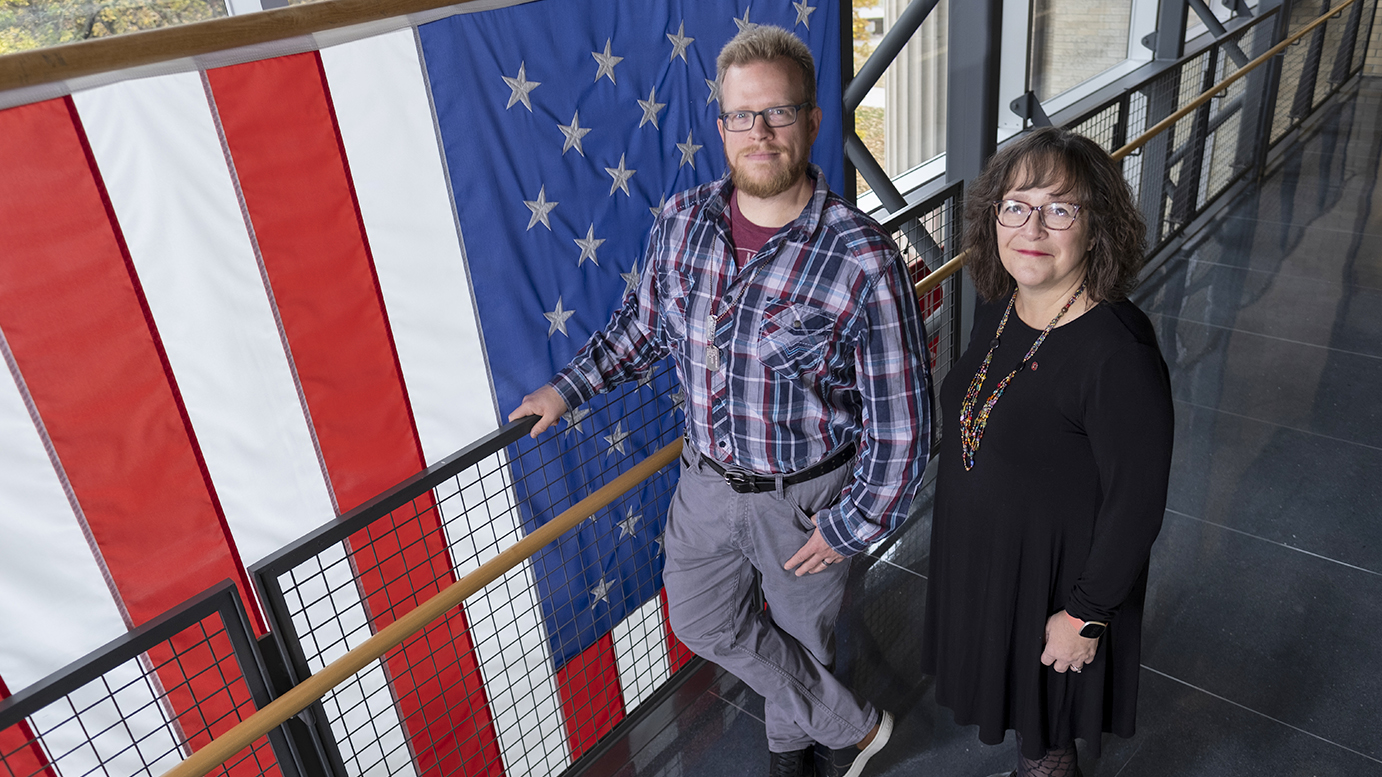Improving care for veterans with brain injuries
Ohio State researchers are centering veterans’ experiences and creating a roadmap for future care.

David Hibler ’12, ’20 MS has spent two decades supporting his military brothers and sisters and the veterans community. Not only did he serve as an Army combat medic during the Iraq War, but he’s been a student advocate for veterans upon returning home to Ohio State.
In recent years, Hibler — currently a doctoral student in evolution, ecology and organismal biology — has taken on the role of researcher as well, working as a liaison between the veterans community and researchers seeking to improve health care services for those who have served.
“I can’t help everybody, but if I can make things better and improve the system, I need to do it,” Hibler says. “I’ve always had a passion to help people, especially my brothers and sisters in arms.
“It’s always been a difficult area for veterans assimilating back out of the service. And veterans’ health care is a very underserved area.”
To help improve that underserved area, Hibler has been working on a number of national research projects. In the most recent one, Hibler and Joy Omslaer, a social worker for brain injury survivors at the Outpatient Rehabilitation Department of The Ohio State University Wexner Medical Center, are leading the university’s effort in a national study on mild traumatic brain injury (mTBI) in the veterans community.
As part of the Mind Over Matter (M.O.M.) community engagement project, Hibler and Omslaer are working directly with veterans and their caregivers to understand their struggles following mTBI suffered during military service.
“We’re looking to understand how mild traumatic brain injury has impacted veterans as they return to civilian life,” Omslaer says. “But we’re also trying to get more information about how veterans want to be approached for research so they can participate in studies to improve their health care.”
A veteran-driven study
Through meetings and discussions, Hibler and Omslaer are chronicling veterans’ stories, struggles and the challenges they face. The result will be a toolkit or roadmap for future researchers and policy makers to understand how to address the veterans community in a meaningful way, making future health care services for mTBI more effective.
The four-state project, which includes Texas, Florida and a South Carolina-Georgia team, is a project of C-P.A.W.W. (Canines Providing Assistance to Wounded Warriors) funded through the Eugene Washington PCORI Engagement Awards program, an initiative of the Patient-Centered Outcomes Research Institute (PCORI), and in conjunction with Ohio State’s Chronic Brain Injury program.
Dr. Cheryl Krause-Parello is leading the project through C-P.A.W.W. and has worked on previous projects with Hibler and Ohio State.
“It’s been a terrific partnership. David has great rapport with the veteran community and he’s amazing to work with. David has also become a good friend,” Krause-Parello says. “David and Joy are actively engaging with veterans and key community stakeholders. They’ve put in great effort to accomplish the goals of the project and have done a wonderful job in capturing the information we need for this to work.”
The work itself is critical in how it’s being conducted, by addressing veterans directly to understand the challenges they face and how it’s most effective to work with them.
“This project and its methodology is really flipping research on its head, going to the population first and asking what works, what doesn’t work, what would you like to see researched and why,” Krause-Parello says. “We want to take what veterans say and translate it into actionable items. My hope is this is a stepping stone for additional veteran-driven community engagement research.”
Gaining understanding
This is Omslaer’s first time working with the veterans community. Hibler recruited her because of her expertise in working with those who have suffered TBI and its lasting effects.
“Mild TBI is often referred to as a silent disability. Often, people don’t understand the lasting effects,” Omslaer says. “They struggle with short-term memory and fatigue, things of that nature. And a lot of people dealing with this feel like a burden to their families and loved ones.”
She says she’s seen examples of exactly that in discussions with these veterans. But there have been eye-opening conversations as well. For instance, she didn’t realize the overwhelming physical wear and tear soldiers endure — the back injuries, neck strain, knee problems they face for years after active duty. She also didn’t know that during service, brain injuries often go undiagnosed.
“As a civilian, I assumed people would be evaluated for TBI and concussions immediately, especially if they’ve been in a warzone. I’m finding through the project that’s not necessarily the case,” she says. “The actual diagnosis can come later, if it does at all. That was surprising to me. And sometimes people just want to fight through it, that attitude of ‘I’ll be ok.’ But that can have lasting effects.”
Another important point Omslaer, Krause-Parello, and Hibler all made was that veterans often feel disconnected from the research and projects they participate in. That won’t be the case here because all outcomes of the community engagement projects will be available on the PCORI and C-P.A.W.W. websites once completed.
It will also become a roadmap future researchers can use.
“It’s the first step toward greater research,” Hibler says. “We can show people how to engage with this community — this is what’s important to them, this is where the people involved want to see treatment and research options start to focus.”